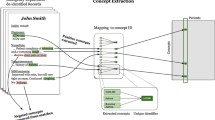Abstract
In this paper, we present a clinically pediatric disease prediction system based on a new efficient hybrid knowledge graph. Firstly, we automatically extract a set of triples by modeling and analyzing 1454 clinically pediatric cases, building a weighted knowledge graph based Naïve Bayes. Secondly, to extract new prediction opportunities from heterogeneous data sources, we model and analyze both classically professional pediatrics textbooks and clinical experiences of pediatric doctors respectively in order to derive prediction rules. Thirdly, we mix up those rules with the weighted knowledge graph we built to propose a new hybrid knowledge graph which can carry on both the Bayesian reasoning and the logic calculation at the same time. Fourthly, in term of that hybrid knowledge graph, we further design a new multi-label classifier based on the well-known Bayesian Ranking for the disease prediction. Finally, we implement such a hybrid knowledge graph based disease pediatric prediction system (HKDP) which uses the descriptions of the patients’ symptoms as the inputs so as to return the predicted candidates of diseases for a child. In our experiments, the comparisons with classical prediction methods prove the validity and advantage of our system, especially guaranteeing good balance between the interpretability and precision of predictions in HKDP.
Access this chapter
Tax calculation will be finalised at checkout
Purchases are for personal use only
Similar content being viewed by others
References
Alshayea, Q.: Artificial neural networks in medical diagnosis. Int. J. Comput. Sci. Issues 96, 197–228 (2011)
Lin, D., Vasilakos, A.V., Tang, Y., Yao, Y.: Neural networks for computer-aided diagnosis in medicine: a review. Neurocomputing 216, 700–708 (2016)
Shortliffe, E.H.: MYCIN: Computer-Based Medical Consultations. Elsevier, New York (1976)
Prema, S., Umamaheswari, P.: Multitude classifier using rough set jelinek mercer Naïve Bayes for disease diagnosis. Circ. Syst. 07, 701–708 (2016)
Zhang, Y., Zhang, Y., Yin, Y., Xu, J., Xing, C., Chen, H.: Chronic disease related entity extraction in online chinese question and answer services. In: Zheng, X., Zeng, D.D., Chen, H., Leischow, Scott J. (eds.) ICSH 2015. LNCS, vol. 9545, pp. 55–67. Springer, Cham (2016). doi:10.1007/978-3-319-29175-8_6
Chen, X., Zhang, Y., Xu, J., Xing, C., Chen, H.: Deep learning based topic identification and categorization: mining diabetes-related topics on Chinese health websites. In: Navathe, Shamkant B., Wu, W., Shekhar, S., Du, X., Wang, X.S., Xiong, H. (eds.) DASFAA 2016. LNCS, vol. 9642, pp. 481–500. Springer, Cham (2016). doi:10.1007/978-3-319-32025-0_30
Prince, M.J.: Predicting the onset of Alzheimer’s disease using Bayes’ theorem. Am. J. Epidemiol. 143, 301–308 (1996)
Hani, A.F.M., Nugroho, H.A., Nugroho, H.: Gaussian Bayes classifier for medical diagnosis and grading: Application to diabetic retinopathy. In: Biomedical Engineering and Sciences, pp. 52–56 (2010)
Subbalakshmi, G., Ramesh, K., Rao, M.C.: Decision support in heart disease prediction system using Naive Bayes. Indian J. Comput. Sci. Eng. 2, 170–176 (2011)
Dangare, C.S., Apte, S.S.: Improved study of heart disease prediction system using data mining classification techniques. Int. J. Comput. Appl. 47, 44–48 (2012)
Patil, A.P., Bhosale, A.P., Ambre, G.: Intelligent Heart Disease Prediction System using Naive Bayes Classifier. Int. J. Adv. Innov. Res. (2013)
Patil, M.R.R.: Heart disease prediction system using Naive Bayes and Jelinek-mercer smoothing. Int. J. Adv. Res. Comput. Commun. Eng. 3, 6787–6792 (2014)
Nahar, J., Imam, T., Tickle, K.S., Chen, Y.P.P.: Computational intelligence for heart disease diagnosis: a medical knowledge driven approach. Expert Syst. Appl. 40, 96–104 (2013)
Nahar, J., Imam, T., Tickle, K.S., Chen, Y.P.P.: Association rule mining to detect factors which contribute to heart disease in males and females. Expert Syst. Appl. 40, 1086–1093 (2013)
Baxt, W.G.: Application of artificial neural networks to clinical medicine. Lancet 346, 1135–1138 (1995)
Dawson, A., Austin Jr., R., Weinberg, D.: Nuclear grading of breast carcinoma by image analysis. Classification by multivariate and neural network analysis. Am. J. Clin. Pathol. 95, S29–S37 (1991)
Inouye, S.K., Viscoli, C.M., Horwitz, R.I., Hurst, L.D., Tinetti, M.E.: A predictive model for delirium in hospitalized elderly medical patients based on admission characteristics. Ann. Internal Med. 119, 474–481 (1993)
Lipton, Z.C., Kale, D.C., Elkan, C., Wetzell, R.: Learning to diagnose with LSTM recurrent neural networks. Comput. Sci. (2015)
Miotto, R., Li, L., Kidd, B.A., Dudley, J.T.: Deep patient: an unsupervised representation to predict the future of patients from the electronic health records. Sci. Rep. 6 (2016)
Zhou, Z.-H., Jiang, Y.: Medical diagnosis with C4. 5 rule preceded by artificial neural network ensemble. IEEE Trans. Inf Technol. Biomed. 7, 37–42 (2003)
Blei, D.M., Ng, A.Y., Jordan, M.I.: Latent dirichlet allocation. J. Mach. Learn. Res. 3, 993–1022 (2003)
Tsoumakas, G., Katakis, I.: Multi-label Classification: An Overview. Department of Informatics, Aristotle University of Thessaloniki, Greece (2006)
Acknowledgments
This work was supported by the Networked Operating System for Cloud Computing (Grant No. 2016YFB1000505) and the Special Program for Applied Research on Super Computation of the NSFC-Guangdong Joint Fund (the second phase). Thanks Zongbo Zhang, Han Li and Dongxue Huo for some preliminary work.
Author information
Authors and Affiliations
Corresponding authors
Editor information
Editors and Affiliations
Rights and permissions
Copyright information
© 2017 Springer International Publishing AG
About this paper
Cite this paper
Liu, P. et al. (2017). HKDP: A Hybrid Knowledge Graph Based Pediatric Disease Prediction System. In: Xing, C., Zhang, Y., Liang, Y. (eds) Smart Health. ICSH 2016. Lecture Notes in Computer Science(), vol 10219. Springer, Cham. https://doi.org/10.1007/978-3-319-59858-1_8
Download citation
DOI: https://doi.org/10.1007/978-3-319-59858-1_8
Published:
Publisher Name: Springer, Cham
Print ISBN: 978-3-319-59857-4
Online ISBN: 978-3-319-59858-1
eBook Packages: Computer ScienceComputer Science (R0)




